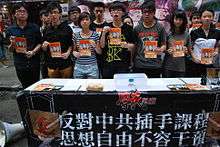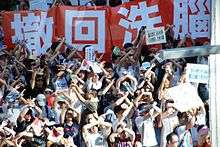Moral and national education

Moral and national education (MNE, Chinese: 德育及國民教育) is a school curriculum proposed by the Education Bureau of Hong Kong, transformed from the current moral and civic education (MCE, Chinese: 德育及公民教育). The subject was particularly controversial for praising the communist and nationalist ideology of China's government on the one hand, and condemning democracy and republicanism on the other.[1]
Background
Moral and civic education was one of the four key tasks in the 2001 curriculum reform undertaken by the Education and Manpower Bureau (superseded by the Education Bureau in 2007), and its framework was revised by the Education Bureau in 2008. On 13 October 2010, Chief Executive Donald Tsang stated in the "Policy Address 2010–2011" that moral and national education would replace MCE to "strengthen national education". The government planned to introduce the new subject in primary schools in 2012 and secondary schools in 2013, and carried out a four-month consultation in 2011. Following the opposition from the public, the government postponed the commencement of the subject by introducing a three-year trial run period, such that the schools were allowed to commence the latest in 2015.[2]
Curriculum
According to the revised Moral and National Education Curriculum Guide (Primary 1 to Secondary 6) (MNE Guide) published in June 2012, the subject has the following aims:[3]
- Development of moral qualities
- Development of a positive and optimistic attitude
- Self-recognition
- Judging in a caring and reasonable manner
- Recognition of identity
- Practice
Controversy
Necessity
Education Bureau (EB), states that Moral, Civic and National Education is an essential element of whole-person education which aims at fostering students' positive values and attitudes through the school curriculum and the provision of diversified learning experiences. It also develops students' ability to analyse and judge issues relating to personal, family, social, national and global issues at different developmental stages, and enhances their willingness to make commitment and contribution.[4]
Since 2001, Moral and Civic Education has been accorded as one of the four Key Tasks under the Curriculum Reform to cultivate students' positive values and attitudes (Priority values include "Perseverance", "Respect for Others", "Responsibility", "National Identity" and "Commitment"). It has been suggested "life event" exemplars being used as learning contexts to enable students to realise positive values.
The Hong Kong Professional Teachers' Union (PTU), an organisation formed by different levels of teachers, stated that MNE is unnecessary according to their speculations, as the original civic education curriculum had already contained "national education". Its vice-president Cheung Man-kwong claims that introduction of MNE is a political action ordered by the central government of the People's Republic of China.[5]
Neutrality of teaching materials
The "China Model National Conditions Teaching Manual", published by the National Education Services Centre under government fundings, was found to be biased towards the Communist Party of China and the so-called "China model". The teaching manual called the Communist Party an "advanced, selfless and united ruling group" (進步、無私與團結的執政集團), while denouncing Democratic and Republican Parties of the United States as a "fierce inter-party rivalry [that] makes the people suffer" (政黨惡鬥,人民當災).[6]
Pressure groups and protests


"Scholarism – The Alliance Against Moral & National Education" (later renamed "Scholarism", 學民思潮) was founded by a group of secondary school students on 29 May 2011, with no political affiliations.[7] Scholarism is the first pressure group formed and has become the leading organisation against MNE. The group is known for being one of the few organisations that protested outside the Central Government Liaison Office after the 1 July March 2012.[8]
Another prominent pressure group, the National Education Parents' Concern Group (Parents' Concern Group, 國民教育家長關注組) was formed in July 2012. The group issued a petition opposing to MNE, initiated by Cardinal Joseph Zen, Ching Cheong, Allen Lee and 27 other public figures, and co-signed by more than 1000 parents.[9]
In July 2012, the "Civil Alliance Against the National Education" (民間反對國民教育科大聯盟) was formed by 15 organisations, including Scholarism, Parents' Concern Group, PTU, Hong Kong Federation of Students, Alliance Youth, Civil Human Rights Front and others.
On 29 July 2012, 30 organisations protested in a march. According to the organisers, more than 90000 protestors, including many parents with their children, participated in the march.[10]
Members of the student activist group Scholarism (學民思潮) began their occupation of the Hong Kong government headquarters on 30 August 2012. Fifty members occupied the public park beneath the government offices, of which three began a hunger strike. The goal of the protest was, expressly, to force the government to retract its plans to introduce Moral and National Education as a compulsory subject. The initial planned length of the occupation was three days.[11] On 1 September, an open concert was held as part of the protest, with an attendance of 40,000; guest performers at the protest include RubberBand, C AllStar, Wong Ka Keung, Anthony Wong and others. During the event the three hunger-strikers ended their hunger strike, and were succeeded by a team of ten other hunger-strikers.[12]
The occupation of the government headquarters area exceeded the initial three-day duration, and on 3 September 2012 the Civil Alliance Against National Education announced that they would continue their occupation of the government headquarters area indefinitely.[13] On 7 September, up to 120,000 attendees, including retired legislator Martin Lee, Cardinal Joseph Zen and businessman Jimmy Lai, attended the demonstration outside the government headquarters, filling the entire North Admiralty area; police said there were 36,000 attendees at 9.30 pm.[14][15][16]
In mid-September 2012, Anonymous hackers threatened the Hong Kong government organisation National Education Services Centre. In their online video, Anonymous members claimed responsibility for leaking classified government documents and taking down the National Education Centre website after the Hong Kong government repeatedly ignored months of wide-scale protests against the establishment of the subject.[17]
Resistance to the NME was documented in the 2014 film, Lessons in Dissent.[18]
References
- ↑ CBCNews. [www.cbc.ca/news/world/hong-kong-fears-pro-china-brainwashing-in-education-1.1296013 Hong Kong fears pro-China brainwashing in education]. The Associated Press. 7 September 2012
- ↑ "教局跪低國民教育科推遲". The Sun. 27 January 2012. Archived from the original on 24 May 2013. Retrieved 29 July 2012.
- ↑ Moral and National Education Curriculum Guide (Primary 1 to Secondary 6), Education Bureau, 19 June 2012. Retrieved 29 July 2012
- ↑ "Moral, Civic and National Education". Retrieved 5 September 2012.
- ↑ 國民教育爭議事件簿, Hong Kong Professional Teachers' Union Retrieved 29 July 2012
- ↑ "國民教育中心反擊洗腦指摘". Oriental Daily. 13 July 2012. Archived from the original on 23 April 2013. Retrieved 29 July 2012.
- ↑ 基本資料, Scholarism
- ↑ "Road closures a flashpoint during tense marches", South China Morning Post, 2 July 2012
- ↑ 香港家長聯署反對“國民教育科”課程指引, "VOA Chinese", 22 July 2012
- ↑ "9萬人上街反洗腦 BB車撞吳克儉落台". Apple Daily. 29 July 2012.
- ↑ "70多名學民思潮成員政總外紮營請願". Yahoo! Hong Kong. 30 August 2012. Archived from the original on 10 January 2014.
- ↑ "日曬雨淋 撤科聲更響 主辦方:全日4萬人 警:高峰時8100". Yahoo! Hong Kong. 1 September 2012. Archived from the original on 4 September 2012.
- ↑ 梁子健 (4 September 2012). "反國教大聯盟籌備罷課 香港特首回應:願對話 8000港人「鐵屋吶喊」". Sing Tao USA. Retrieved 8 September 2012.
- ↑ Shirley Zhao (8 September 2012), "Record-high turnout for anti-national education protests". Time Out
- ↑ "團 體 稱 12 萬 人 集 會 反 國 教 警 方 稱 3 萬 6 千". RTHK. 7 September 2012. Retrieved 7 September 2012.
- ↑ "反國教集會大會宣布有十二萬人出席". Commercial Radio Hong Kong. 7 September 2012. Retrieved 8 September 2012.
- ↑ 攻陷國教網站 黑客匿名:要革命! 16 September 2012. Retrieved 28 January 2013
- ↑ “Lessons in dissent”, The Economist, 4 July 2014
External links
-
 Media related to Moral and National Education at Wikimedia Commons
Media related to Moral and National Education at Wikimedia Commons